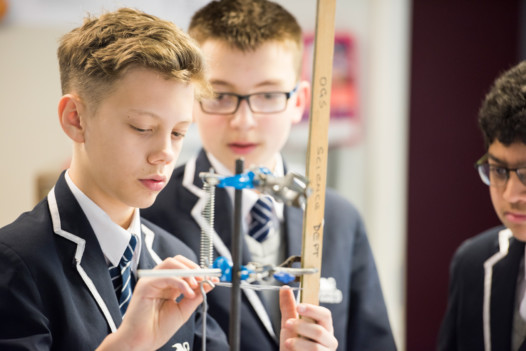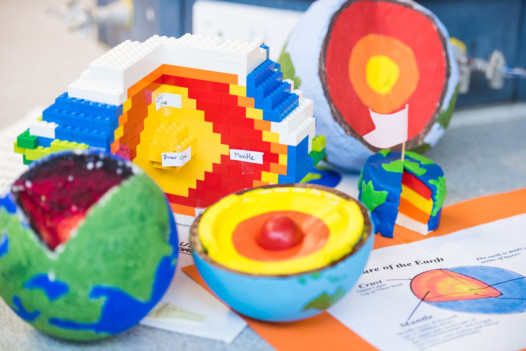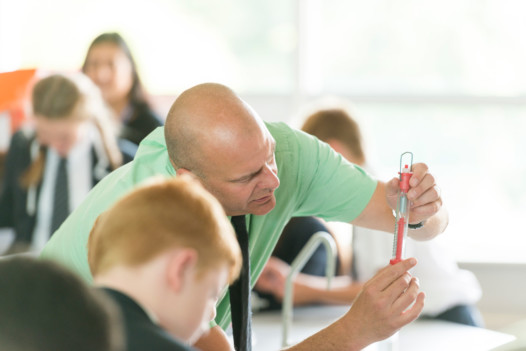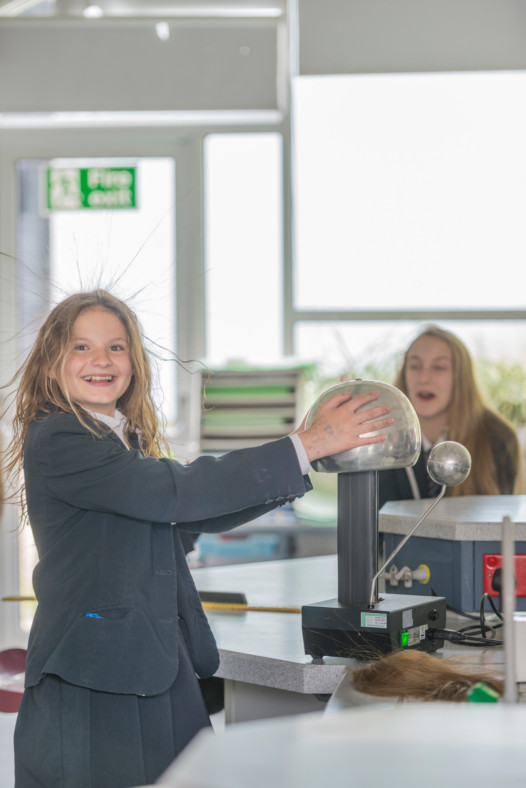Science
The Science Learning Area is accommodated in two buildings housing seven spacious, modern and well equipped laboratories in addition to three preparatory rooms. All laboratories are wireless networked and have a computer, projector and interactive whiteboards. The area has 32 laptops for student use in the laboratory. We have ten highly qualified staff who are committed to providing a variety of teaching methods to motivate and engage students towards science and to encourage students to continue their science studies beyond Key Stage 4. We work together in a collaborative fashion to plan, review and improve all aspects of the science curriculum. The team also has two technicians who provide practical resources, assist in lessons and support the running of special events.
The Curriculum at KS3
During Years 7 and 8 students cover aspects of biology, chemistry and physics building on prior knowledge from primary schools and embedding the foundations ready for GCSE science which begins in Year 9. The bespoke curriculum has been designed to introduce key ideas in Year 7 which provide students with the foundations to build on in the coming years. Practical science allows students to apply their knowledge with more freedom as well as develop a toolbox of transferable skills; for example problem solving, drawing valid conclusions from evidence and evaluating claims. For this reason each topic has a key practical which focusses on one of these skills. The students are assessed in a variety of ways at the end of each term to track individual progress and ensure all students are stretched and challenged whatever their pathway.
Year 7
- Energy – Energy stores and transfers, particles, properties of solids, liquids and gases, energy transfers during state changes, transfer of energy through substances.
- The Human Body – Body systems and how each system is adapted to carry out its function. This topic includes the digestive system, respiratory system, circulatory system and the reproductive systems.
- Elements and the Periodic Table – The periodic table, properties of elements in group 1, 7 and 8, solubility and separating substances.
- Forces – Recognise, measure and representing forces, Speed and Space.
- Our Dynamic Earth – The structure of the earth, the rock cycle, changes to our atmosphere and the greenhouse effect.
- Ecosystems – Food chains, how humans impact food chains, plant and animal adaptations to their environment and plant reproduction.
Year 8
- Cells and Microscopes – Using a microscope, the parts of the cell, bacterial cells.
- Variation and Evolution – what causes variation and differences, natural selection, evolution and extinction.
- Very tiny particles – Atoms and their parts, making and naming compounds, chemical formula.
- Reactions – chemical and physical reactions, writing balanced equations, combustion reactions, acids and alkalis, fast and slow reactions.
- Electricity – Circuits and components, potential difference and current, parallel and series circuits, static electricity.
- Waves – Sound and light waves, colour, lenses and the eye, uses of waves.
KS4
Students will begin studying material for the GCSE course in Year 9 students. Early modules bridge and consolidate content from final KS3 modules before students progressing onto the foundations of their GCSE modules. During Year 9 students all students will complete units of Biology, Chemistry and Physics. During the first two terms students will complete a range of assessments to suit the needs of all learners.
Students will be streamed into one of two pathways part way through Year 9:
- Trilogy (up to six groups out of 8)
- Separate Sciences (Biology, Chemistry and Physics GCSE) studied by up to two groups out of 8.
At Key Stage 4, students follow AQA syllabi.
KS5
At Key Stage 5, A levels in Biology, Chemistry and Physics are offered. Please refer to the Sixth Form Prospectus for further course details.
Science and STEM Clubs
Raising awareness of where studying STEM subjects can take students beyond school is an important part of our work. We have strong links with the University of Bath, University of Bristol and University of West England which see students visiting laboratories, taking part in competitions and workshops as well as gaining an insight into how research scientists work. Students benefit from visits from STEM ambassadors working in industry and research as well as workshops run by the likes of Bloodhound SSC, Dyson, SS Great Britain, Atkins and the Royal Academy of Engineering.
Our Science Club runs every Wednesday after school. Students work through a programme published at the start of each term. Activities include conducting experiments to gain a CREST award, learning more about space and disections.
University Links and Professional Scientists
Raising awareness of where studying STEM subjects can take them beyond school is an important part of our work. Our students have received visits from STEM ambassadors working in industry and researching in local universities. Ambassadors have presented their work as well as informed students of how they progressed into their current work. Students have also visited the University of Bath and University of Bristol’s Chemistry labs, taking part in competitions and workshops as well as gaining an insight into how research scientists work. Students have also had the opportunity to visit Science Live conferences where leading scientists lecture on their chosen field and recent scientific developments.
Teaching and support staff
| Mrs S Cornelius | Leader of Learning: Science (maternity leave) |
| Mr D Axe | Science Teacher |
| Miss K Eatock | Science Teacher |
| Mr S Hellard | Science Teacher |
| Miss C Houston | Acting Leader of Learning; Science |
| Mr C King | Head of Physics |
| Miss C Lam | Science Teacher |
| Mrs J Macalister | Head of Year 9. Science Teacher |
| Miss A Millest | Acting Second in Science |
| Mr J Reeves | Deputy Head Teacher and Science Teacher |
| Mr Taylor | Science Teacher |




